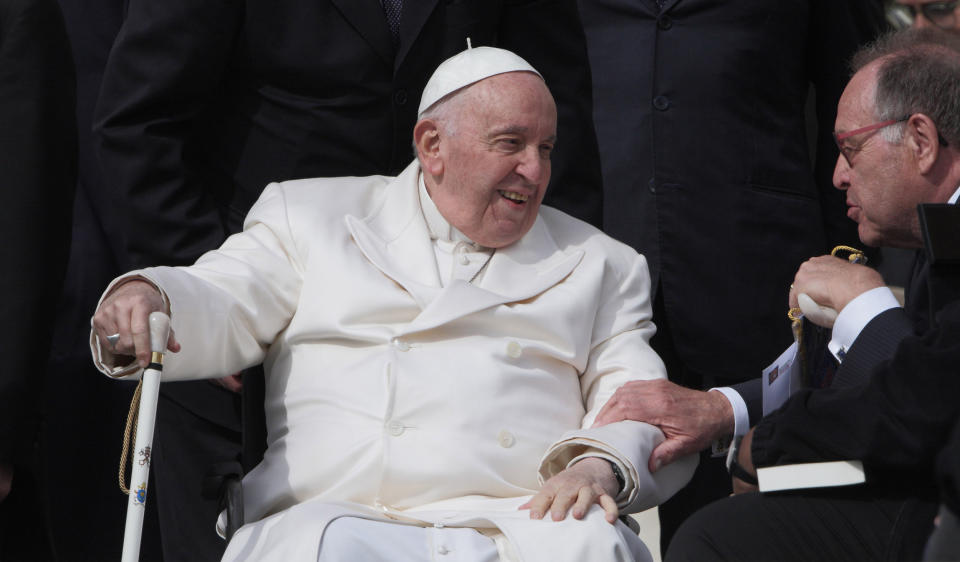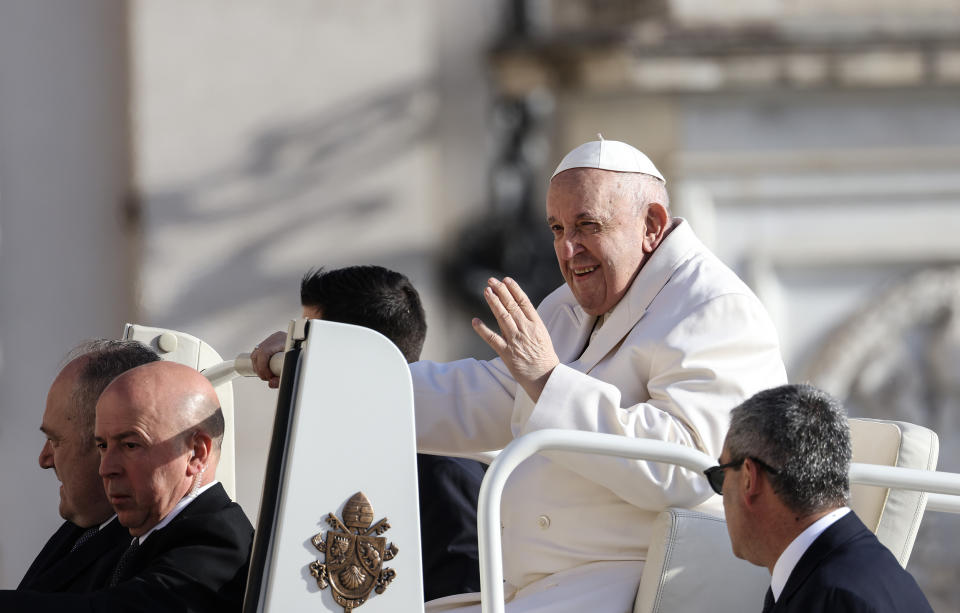Vatican reveals condition that led to Pope Francis hospitalization
- Oops!Something went wrong.Please try again later.
The Vatican has released more details about Pope Francis' condition after he was hospitalized Wednesday, March 29, for a respiratory infection.
The pope has been diagnosed with bronchitis, "which required the administration of antibiotic therapy on an infusion basis which produced the expected effects with a marked improvement in his state of health," the Vatican said in a statement Thursday, March 30, adding that "he could be released in the coming days."
The Vatican shared that he "spent the afternoon at Gemelli (hospital) devoting himself to rest, prayer and some work duties.” Earlier in the day on Thursday, another statement from the Vatican explained that the pontiff was "progressively improving."
Pope Francis was hospitalized with a respiratory infection after complaining of breathing issues, NBC News reported.
The respiratory infection he was diagnosed with was not COVID-19, and he was expected to “require a few days of appropriate hospital medical treatment,” the Vatican said in a March 29 news release.

Bronchitis occurs when the airways in the lungs become inflamed, which can lead to coughing and mucus, according to the National Heart, Lung and Blood Institute. Acute, aka short-term, bronchitis is usually caused by a viral infection, but it can also be bacterial, which appears to be the case with the pope, given his treatment with antibiotics.
Acute bronchitis usually improves without medical attention after two to three weeks. But if symptoms don't improve after this time or lead to difficulty breathing, then it's important to seek medical care.
This hospitalization is the latest in a series of health issues the pope has experienced in recent years.
Knee issues
Francis has experienced mobility issues due to strained ligaments in his right knee. In May 2022, he made his first public appearance in a wheelchair while meeting with nuns and mother superiors at the Vatican.
“There is a problem, this knee doesn’t work,” he said at the time, according to The Guardian. “I have to obey the doctor, who told me not to walk.”

He also canceled a planned trip to Africa in July 2022 because of ongoing laser and magnetic therapy for his knee, according to the Associated Press.
The pontiff also told Reuters in July 2022 that he had suffered “a small fracture” in his right knee after taking a misstep.
Since then, he has also appeared in public using a cane.
Dr. José María Villalón, who has worked with Francis to improve his mobility, called him “a very nice but very stubborn patient” in November, according to The Guardian.
The pope did not wish to undergo surgery for his knee following his experience with colon surgery in 2021.
Intestinal surgery
The pope underwent surgery in July 2021 for diverticular stenosis of the sigma, or a narrowing of the colon.
The pope was experiencing a restriction of his intestine due to “‘diverticula,’ or pouches or sacs, that form on the wall of the large intestine narrowing the passage,” the Vatican said in a release at the time.
According to Mayo Clinic, diverticula are common after age 40 and don't usually cause health problems. But when they do, symptoms include severe abdominal pain, fever, nausea and changes in bowel habits. When diverticula require surgery, it's usually because it's "severe or recurring," per the Mayo Clinic.
Around 13 inches of the pope’s colon were removed during the surgery, according to NBC News.
While the surgery went smoothly, the pope reportedly did not respond well to undergoing general anesthesia during his intestinal procedure, contributing to his decision to not have surgery for his knee issues.
Sciatica
Francis has spoken about experiencing sciatica. Sciatica is an often painful condition that involves an irritation or compression of the sciatic nerve, which runs from the lower back down to the feet, according to the NHS.
In January 2021, the pontiff shared that sciatic pain was making it difficult to stand. It reportedly led him to canceling multiple events.
“I would like to speak to you standing up, but sciatica is a troublesome guest,” he said while addressing a Catholic Church tribunal, Agence France-Presse reported at the time. “So I apologize and will speak sitting down.”
Partial lung removal
The pontiff had part of one lung removed as a young man, according to NBC News, leading him often to speak in a whisper.
Last year, the pope said that while he didn't have any plans to step down as pontiff, he acknowledge that the "door was open" and that he was slowing down and no longer able to travel as easily.
“It’s not strange. It’s not a catastrophe. You can change the pope,” he said at a press conference in July 2022. “I think at my age and with these limitations, I have to save (my energy) to be able to serve the church, or on the contrary, think about the possibility of stepping aside."
“I’ll try to continue to do the trips and be close to people because I think it’s a way of servicing, being close. But more than this, I can’t say,” he added.
This article was originally published on TODAY.com

